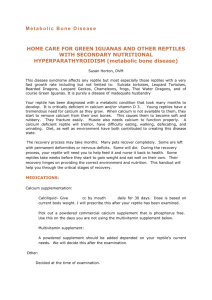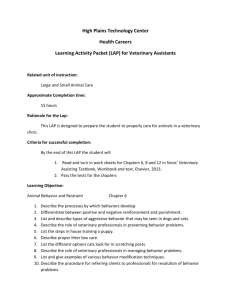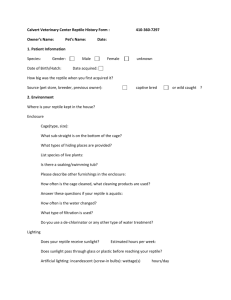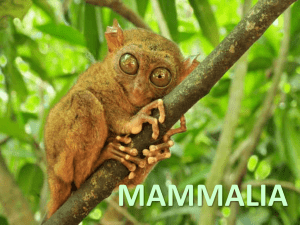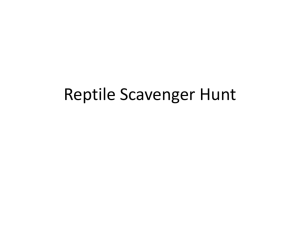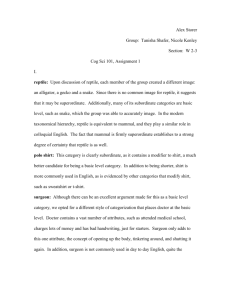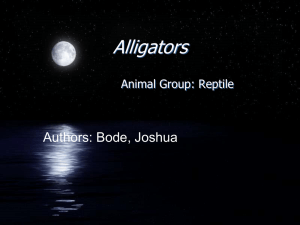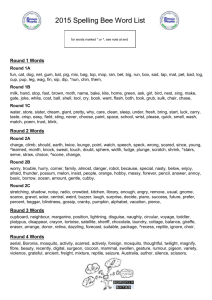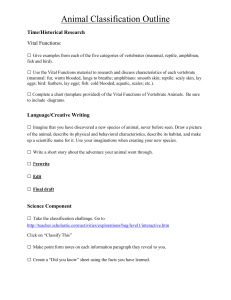Syllabus - College of Veterinary Medicine
advertisement
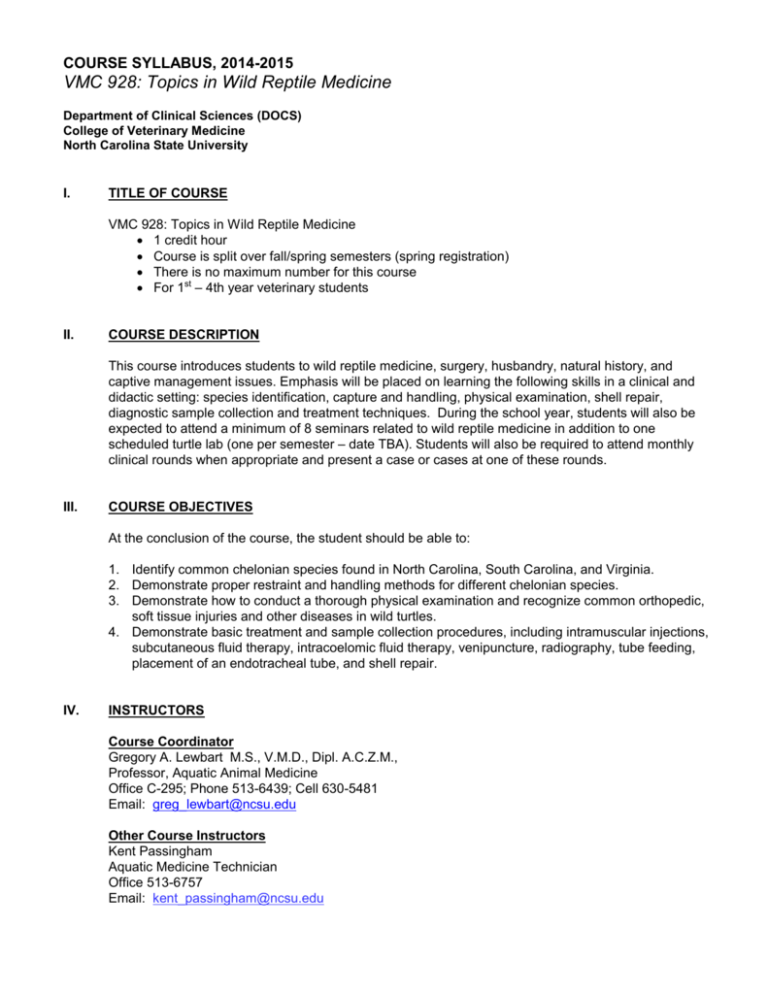
COURSE SYLLABUS, 2014-2015 VMC 928: Topics in Wild Reptile Medicine Department of Clinical Sciences (DOCS) College of Veterinary Medicine North Carolina State University I. TITLE OF COURSE VMC 928: Topics in Wild Reptile Medicine 1 credit hour Course is split over fall/spring semesters (spring registration) There is no maximum number for this course For 1st – 4th year veterinary students II. COURSE DESCRIPTION This course introduces students to wild reptile medicine, surgery, husbandry, natural history, and captive management issues. Emphasis will be placed on learning the following skills in a clinical and didactic setting: species identification, capture and handling, physical examination, shell repair, diagnostic sample collection and treatment techniques. During the school year, students will also be expected to attend a minimum of 8 seminars related to wild reptile medicine in addition to one scheduled turtle lab (one per semester – date TBA). Students will also be required to attend monthly clinical rounds when appropriate and present a case or cases at one of these rounds. III. COURSE OBJECTIVES At the conclusion of the course, the student should be able to: 1. Identify common chelonian species found in North Carolina, South Carolina, and Virginia. 2. Demonstrate proper restraint and handling methods for different chelonian species. 3. Demonstrate how to conduct a thorough physical examination and recognize common orthopedic, soft tissue injuries and other diseases in wild turtles. 4. Demonstrate basic treatment and sample collection procedures, including intramuscular injections, subcutaneous fluid therapy, intracoelomic fluid therapy, venipuncture, radiography, tube feeding, placement of an endotracheal tube, and shell repair. IV. INSTRUCTORS Course Coordinator Gregory A. Lewbart M.S., V.M.D., Dipl. A.C.Z.M., Professor, Aquatic Animal Medicine Office C-295; Phone 513-6439; Cell 630-5481 Email: greg_lewbart@ncsu.edu Other Course Instructors Kent Passingham Aquatic Medicine Technician Office 513-6757 Email: kent_passingham@ncsu.edu V. SCHEDULE Fall Semester – Introductory lecture will cover turtle natural history, native species identification and characteristics, captive management/rehabilitation problems, handling, restraint, physical examination, zoonoses, and anatomy. Shell fracture repair and emergency medicine of sick and injured turtles will also be covered. There will be a shell-repair lab in either the fall and spring semesters. Spring Semester – Students will register for this course in the spring. The majority of clinical cases arrive during the summer months, but, a significant caseload begins to appear in April and May. Students will be divided into groups and assigned both on call and treatment duty. In most cases students would not be doing either more than once per week. Seminars – A minimum of 8 hours of seminars is required. Students would are expected to attend monthly Turtle Rescue Team (TRT) clinical rounds at least once per month and Zoological Medicine rounds (CBS817) related to wild reptile medicine and surgery when their schedule permits. All students will be required to present clinical rounds (case presentation) at least once during the year. The 8 hours of seminar requirement can be satisfied with any formal lecture on wild reptile medicine, surgery, or natural history. This would include lectures given at wildlife rehabilitation seminars, CE conferences (e.g. ARAV, AAZV, IAAAM, NAVC, NCVC), or the annual NC Herpetological Society meeting. Students should maintain records of lectures attended and forward these to one of the instructors at the end of the year. VI. POLICIES Required Materials 1. The dress code is casual, however, in some cases lab coats or scrubs may be required. 2. Pen light 3. There are no required books for this course. The following book is recommended: Mader DR. 2006. Reptile Medicines and Surgery (2nd Ed.). Elsevier. Attendance Policy 1. This is a one-credit course that is spread over fall and spring semesters, however, course registration is done in the spring. 2. Students will be required to attend at least one TRT introductory lecture and shell repair lab during the year. 3. Students will also be responsible for attending eight reptile-related lectures in the following courses: Topics in Zoological Medicine I & II (schedule on WAAZM board; reptilian topics only) WAAZM noon seminars (reptile-oriented topics only) House Officer seminar series (reptile-oriented topics only) See Seminars section above for other suggestions Note that attendance at required didactic lectures (e.g. reptile lectures in VMC 937 or 953) will not count toward the VMC-928 seminar requirements. 4. If students are unable to meet all of the attendance requirements they should withdraw from the course before the deadline. Incomplete grades must be satisfied within one semester. Grading and Seminar Documentation The course will be graded on a Pass / Fail basis. Students will be assessed on the basis of their knowledge and active participation in all laboratory exercises and their attendance and documentation at reptilian seminars (as listed below). There are no exams in this course. At the end of each semester, students may be asked to fill out instructor evaluations anonymously. The students must document their attendance at a minimum of 8 hours of reptilian seminars during the course of the school year. Documentation should include the title and speaker of the presentation, plus the date, location, and length of the talk. Classroom Conduct Students should observe the policies stated in the NCSU-CVM Student Handbook. Students are expected to observe all components of the CVM "Code of Conduct" as detailed in the CVM Student Handbook and conduct themselves as professionals in all matters, including honesty and ethics. Assembly Point The TRT clinic is located in room F-266. Rounds are normally held in D-239-N or in the TRT clinic room. See announcements for the time and location of other talks and seminars. VII. REQUIRED AND RECOMMENDED TEXTBOOKS A. Required textbooks – none B. Recommended References - The following list of reptile medicine textbooks may be useful, with comments added by the course coordinator. Frye, F.L. 1991. Biomedical and Surgical Aspects of Captive Reptile Husbandry (Vols. I & II). Krieger Publishing Co., Malabar, Fl, 637 pp. Very comprehensive text with plenty of large color images. Drawbacks are its expense (about $175.00), unwieldy size, and the fact that it is now over 20 years old. There is a copy in the TRT clinic. Gibbons PM, Klaphake E, Carpenter JW. Reptiles. 2013. In: Exotic Animal Formulary, Fourth Edition (J. Carpenter and C. Marion eds.), Elsevier Saunders, St. Louis, MO, pp. 84-170. Mader, D.R. 2006. Reptile Medicine and Surgery (2nd ed.). Elsevier Co., Phila., 1238 pp. The “goldstandard” for reptile medicine in the U.S. Mader DR and Divers SJ. 2014. Current Therapy In Reptile Medicine And Surgery. Saunders Co., Phila., 488 pp. Mayer J, Connelly TM. 2013. Clinical Veterinary Advisor: Bird And Exotic Pets, 1e. Saunders Co., Phila., 784 pp. McArthur S, Meyer J, and R Wilkinson. 2004. Medicine and Surgery of Turtles and Tortoises. Blackwell Publishing. 600 pp. This is an excellent book with many color images. There is a copy in the TRT lab. COURSE JUSTIFICATION This course at the CVM provides a unique learning opportunity for veterinary students to explore a diverse area of veterinary medicine. There is no equivalent program in the DVM core curriculum to provide hands-on exposure and training in the area of wild reptile medicine and husbandry. Four lectures in the third year curriculum (VMC 953, Laboratory Animals and Special Species Medicine) are devoted to reptile medicine, however, the bulk of theses lectures are designed to prepare students for pet reptile medicine. One related course (VMC 991R), Advanced Herptile Medicine, is offered as a one-week Selective to a maximum of 20 students every second year. While there may be overlap between these courses in some of the skills learned, the seminar requirement of this course will provide learning experiences not duplicated in the selectives course. In addition, this course will allow a much greater number of DVM students to be exposed to wild reptile medicine than will be possible with the limited enrollment of the reptile selective course. The experiences and knowledge gained in this course will be applicable to many aspects of pet reptile medicine, as well provide useful skills for private practitioners. Catalog Description The NCSU-CVM Turtle Rescue Team treats sick and injured wild turtles belonging to nine different species. First, second, and third year veterinary students will be responsible for case management, coordinating consultations, diagnostic testing within the hospital, and placing recuperating animals with local wildlife rehabilitators. Students are also required to attend monthly rounds, eight seminars, and make an oral presentation.
